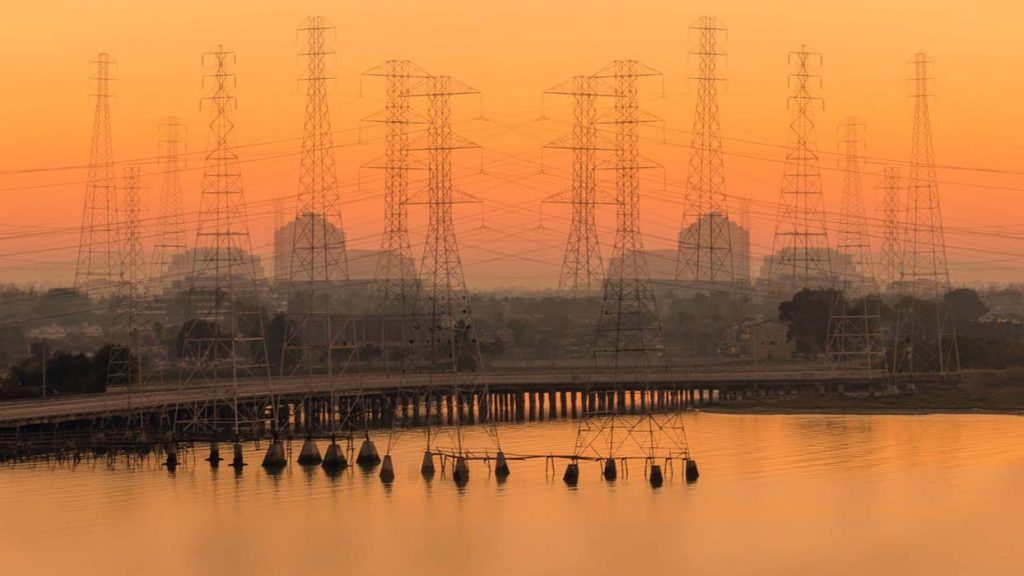Cut emissions, save 317,000 people: What a nationwide clean electricity standard could do
By Oliver Milman | July 15, 2021
 Sunrise on the power grid in San Mateo, California. Image courtesy of Sterling Lanier/Unsplash
Sunrise on the power grid in San Mateo, California. Image courtesy of Sterling Lanier/Unsplash
Editor’s note: This story was originally published by The Guardian. It appears here as part of the Climate Desk collaboration.
A Biden administration plan to force the rapid uptake of renewable energy would swiftly cut planet-heating emissions and save hundreds of thousands of lives from deadly air pollution, a new report has found amid growing pressure on the White House to deliver a major blow against the climate crisis.
Out of the various climate policy options available to the new administration, a clean energy standard would provide the largest net benefits to the United States, according to the report, in terms of costs as well as lives saved.
A clean energy standard would require utilities to ratchet up the amount of clean energy they use—such as solar and wind—through a system of incentives and penalties. The Biden administration hoped to include the measure in its major infrastructure bill but it was dropped after compromise negotiations with Republicans.
But the new report, conducted by a consortium of researchers from Harvard University, Georgia Institute of Technology, and Syracuse University, suggests it would be the most effective tool in reaching a White House goal of 80 percent renewable energy use by 2030. Joe Biden has said he wants all electricity to be renewable by 2035.
A clean energy standard to reach the 80 percent goal by the end of the decade would save an estimated 317,500 lives in the United States over the next 30 years, due to a sharp reduction in air pollution from the burning of coal, oil, and gas. In 2030 alone 9,200 premature deaths would be avoided once the emissions cut is achieved. The number of lives saved would be “immediate, widespread and substantial,” the report states.
A total of $1.13 trillion in health savings due to cleaner air would be achieved between now and 2050, with air quality improvements most acutely felt by black people who currently face disproportionate harm from living near highways and power plants. Every state in the United States would gain better air quality, the report found, although the greatest benefits would go to Ohio, Texas, Pennsylvania, and Illinois—all states with substantial fossil fuel infrastructure.
The rapid switch to renewables would cost around $342 billion until 2050, via capital and maintenance costs, although fuel costs would dwindle because renewables are cheaper to run than fossil fuels. The study added, however, that the financial benefits from addressing the climate crisis would dwarf this figure, at nearly $637 billion.
“The costs are much lower than we expected and the deaths avoided are much higher; there really is a huge opportunity here to address climate change and air quality,” said Kathy Fallon Lambert, a study co-author and an air quality expert at the Harvard TH Chan School of Public Health. “This would be a huge leap in ambition and we’d see that in the health impacts. There would be millions of fewer asthma attacks, for example. And this doesn’t even consider the health impacts from heat and other climate-related causes.” Lambert said a clean energy standard would be “extremely effective” at slashing emissions, far more so than other proposals such as a carbon tax.
Biden is facing pressure from environmentalists, as well as major companies such as Apple and Google, to implement the new standard after it was dropped from the infrastructure bill. The president has said the measure will be included in a new reconciliation bill that can pass along party lines, although that will require every single Democratic senator to vote for it, which will prove a challenge.
The White House is determined this will happen however, with Gina McCarthy, Biden’s top climate adviser, saying the measure is a “non-negotiable” in the next infrastructure package.
“We need to make sure that we’re sending a signal that we want renewable energy and that it’s going to win,” McCarthy told Punchbowl News last week.
Together, we make the world safer.
The Bulletin elevates expert voices above the noise. But as an independent nonprofit organization, our operations depend on the support of readers like you. Help us continue to deliver quality journalism that holds leaders accountable. Your support of our work at any level is important. In return, we promise our coverage will be understandable, influential, vigilant, solution-oriented, and fair-minded. Together we can make a difference.
Keywords: clean electricity standard, climate change, climate crisis, electrical grid, emissions, global warming, renewables, solar, wind
Topics: Climate Change














